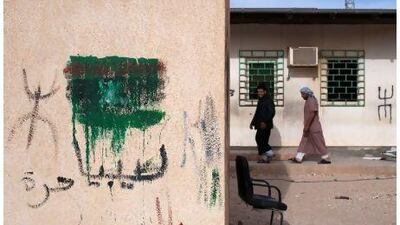DEHIBA CROSSING, TUNISIA-LIBYA BORDER // Alongside their revolutionary flags, Libyan rebels have decorated this remote border post with a strange symbol: two half-circles facing apart, bisected by a single vertical line.
The symbol, a "z" in the alphabet of Libya's Amazigh minority, appears across North Africa as a badge of cultural identity.
But at the border post, other Amazigh letters also spell out a new allegiance.
"The February 17th Revolution," said Anwar Jerbi, a fighter manning the post one afternoon in April. "I'm Amazigh, like most of the guys here, but we take our orders from Benghazi."
Long persecuted by the regime of Col Muammar Qaddafi, Libya's Amazighs, also known as Berbers, have overwhelmingly backed the revolt aimed at toppling him. In the process, they hope to win a place for their language and culture.
The border post has repeatedly traded hands since April, as rebels have fought to maintain a lifeline for cities in Libya's Nafusah Mountains that are under assault by Col Qaddafi's forces.
According to a report last week by Human Rights Watch, those cities have been bombarded almost daily in recent weeks with Grad rockets fired into residential areas.
The Nafusah Mountains, a chain of stark red escarpments cutting across north-western Libya, are populated mainly by an estimated scores of thousands of Amazighs, who trace their roots to pre-Islamic farmers and herders.
Many Libyan Amazighs also belong to Islam's minority Ibadi sect, which differs from both Sunni and Shiite traditions.
Larger Amazigh populations in Morocco and Algeria have won cultural concessions in recent years that include a measure of state support for their language, a group of dialects that are distant cousins of Arabic.
In Libya, however, calls for similar rights were ignored by Libya's monarchy and have been quashed by Col Qaddafi, a Pan-Arabist who has proclaimed Libya a purely Arab state since seizing power in 1969.
"The Amazighs, along with other minority groups, were persecuted in a form of largely non-violent cleansing," said Ronald Bruce St John, a Libya expert and the author of books on the country.
Col Qaddafi forbade the use of Amazigh names, refused to recognise their language and had their contribution to Libyan culture written out of history books, Mr St John said. While Col Qaddafi has insisted that all Libyans are Arabs, some scholars say that Arab-Amazigh intermingling has made ethnicity irrelevant, while bringing linguistic identity to the fore.
"It's not clear whether Libyan Amazigh see being Amazigh as incompatible with being Arab," said Lameen Souag, a specialist in North African languages and former curator of the Rosetta Project, an archive of endangered languages.
Libya's largest tribe, the Warfalla, speaks Arabic yet bears an apparently Amazigh name, Mr Souag said.
In 2007, Libya's government gingerly reached out to Amazighs, said Mr St John. An Amazigh conference was allowed in Tripoli, the capital, and state infrastructure projects were promised for Amazigh communities.
The following year, the outreach stopped for reasons that remain unclear. According to US diplomatic cables made public by WikiLeaks, US diplomats were barred from visiting Amazigh areas, while Col Qaddafi travelled to the Nafusah Mountains to proclaim Libya's Arab character.
Last December, police in Tripoli arrested the Amazigh brothers Mazigh and Maghris Abouzakhar on charges of spying.
"But their real crime was showing interest in the Amazigh language," said their father, Fathi Abouzakhar, a professor from Sirte University who now helps settle Libyan refugees in the Tunisian city of Tataouine.
Facing execution, the brothers were freed in February as Libya slid into war and fellow prisoners rioted.
In the Nafusah Mountains, anti-regime fighters pledged allegiance to rebel leaders in the eastern city of Benghazi via online videos - in one case speaking both Arabic and Amazigh. Col Qaddafi sent troops to force rebellious towns into submission.
On April 2, military cars armed with machine guns and Grad rocket launchers rolled into Taghma, a village near the Abouzakhar family's hometown of Yefren, said Mr Abouzakhar.
"They said we must fly the green flag before 9am the next morning," he said. "But they couldn't wait. They started shooting before dawn."
Mr Abouzakhar fled to Tunisia with his wife, daughter and in-laws, among over 40,000 Libyan refugees who have crossed the border since the uprising began.
Those refugees include Arabs from the Nafusah Mountains like Majdi Bendella, 30, a civil servant from the city of Nalut, whose brother Ramy, 20, was shot dead by regime loyalists on March 18, he said.
"Everyone was in the square celebrating the UN vote for a no-fly zone," said Mr Bendella. "Suddenly the revolutionary committees opened fire with Kalashnikovs from their cars. Ramy was hit four times."
Mr Bendella and another man rushed Ramy to the hospital, but doctors there lacked supplies to treat him. "By 4am my brother was dead," Mr Bendella said.
The family buried Ramy the next day in a graveyard at the edge of Nalut, beneath a clear blue sky. A fortnight later they fled to the home of friends in Tunisia.
Mr Bendella's family speak Arabic at home and Amazigh with their neighbours. In April he was preparing to return to Nalut, to join rebel fighters alongside his father and three remaining brothers.
The Abouzakhar brothers are still in the Nafusah Mountains documenting the fighting there, said Mr Abouzakhar.
"Qaddafi considered us enemies because of our culture," he said. "But we're fighting him because he's against freedom and democracy. He is behind the problems of Amazigh and Arab alike."

